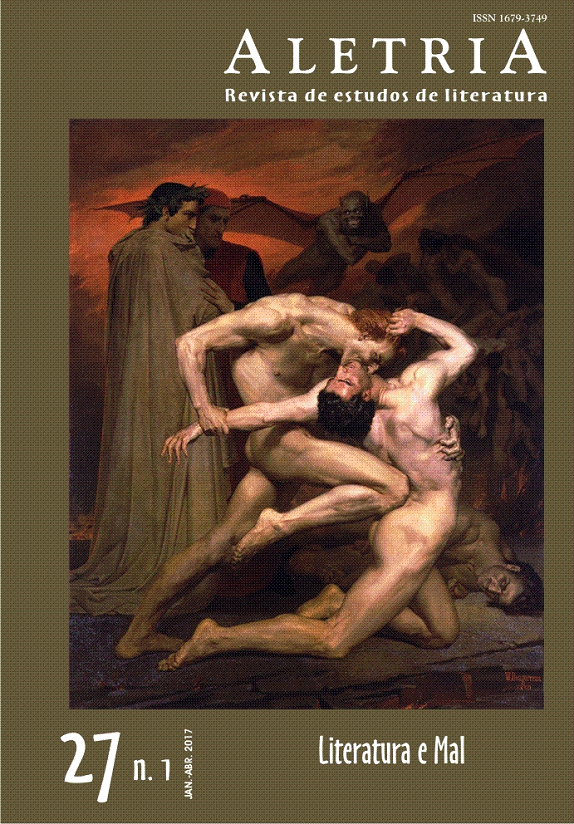O mal na literatura medieval: o exemplo do estudante incontinente
DOI:
https://doi.org/10.17851/2317-2096.27.1.73-89Palabras clave:
François Villon, literatura medieval, representação do malResumen
Este artigo discute a representação do mal na literatura medieval a partir do exemplo do estudante incontinente, em particular, da personagem do célebre malfeitor François Villon. Para isso, procuramos decifrar a enigmática conclusão do seu primeiro poema longo, o Lais, cuja descrição metalinguística da perda de consciência pelo louco amante oferece uma explicação escolástica para a sua perturbação mental. Essa explicação permite a Villon justificar a fuga de Paris por meio da sua incontinência que, como sempre acontece na lírica cortês da época, é amorosa e moral ao mesmo tempo.
Descargas
Referencias
AQUINO, Tomás de, Santo. Comentario a la Ética a Nicómaco de Aristóteles. Navarra: Ediciones Universidad de Navarra, 2010.
ARISTÓTELES. Acerca del alma. Madrid: Gredos, 1978.
ARISTÓTELES. Ética nicomáquea; ética eudemia. Madrid: Gredos, 1985.
BURGER, André. L’entreoubli de Villon. Romania, Paris, v. 79, n. 316, p. 485-495, 1958.
CHAPELÃO, André. Tratado do amor cortês. São Paulo: Martins Fontes, 2000.
CHARTIER, Alain; HERENC, Baudet; CAULIER, Achille. Le cycle de La belle dame sans mercy: une anthologie poétique du XVe siècle. Paris: Champion, 2003.
CHASTELLAIN, Georges. Œuvres. Bruxelles: Heussner, 1865.
CORBECHON, Jean. Le livre des propriétés des choses. Paris: Stock, 1997.
COSTA, Daniel Padilha Pacheco da. François Villon, um poeta maldito avant la lettre? A Balada dos enforcados como um modelo poético de Rimbaud, Pound e Augusto de Campos. Estação Literária, Londrina, v. 12, p. 70-85, 2014.
COSTA, Daniel Padilha Pacheco da. O amor cortês pelo avesso: François Villon e o debate sobre o Roman de la rose. Caligrama: Revista de Estudos Românicos, Belo Horizonte, v. 19, n. 1, p. 81-103, 2014. https://doi.org/10.17851/2238-3824.19.1.81-103
DRAGONETTI, R. Le contredit de François Villon. MLN, Baltimore, v. 98, n. 4, p. 594-623, 1983. https://doi.org/10.2307/2905896
DRAGONETTI, Roger. La soif de François Villon. In: DERENS, Jean; FREEMAN, Michael; DUFOURNET, Jean. Villon: hier et aujourd’hui. Paris: La Bibliothèque de la Ville de Paris, 1993. p. 123-136.
GARLANDE, Jean. Parisiana poetria: De arte prosayca, metrica et rithmica. New Haven: Yale University Press, 1974.
GROSSETESTE, Robert. The Greek Commentaries of the Nicomachean Ethics of Aristotle in the Latin Translation of Robert Grosseteste. Leiden: Brill, 1973-1991. 4 v.
KOROLEC, Jerzy. Le commentaire d’Averroès sur l’Éthique à Nicomaque. Bulletin de Philosophe Médiévale, Brepols Pubishers, v. 27, p. 104-107, 1985.
KUHN, David. La poetique de François Villon. Paris: Librairie Armand Colin, 1967.
LACY, Norris. In defense of Villon’s Lais. The French Review, Marion, v. 72, n. 6, p. 1000-1009, 1999.
LONGNON, Auguste. Étude biographique sur François Villon d’après les documents inédits conservés aux Archives Nationales. Paris: Menu, 1877.
PAUL, Jacques. L’Histoire intellectuelle de l’Occident médiévale. Paris: Armand Colin, 1973.
PORTALO, Rocío Orsi. El saber del error: filosofía y tragedia en Sófocles. Madrid: Plaza y Valdés, 2007.
SPINA, Segismundo. A lírica trovadoresca. 4. ed. São Paulo: Edusp, 1991.
VERLAINE, Paul. Les poètes maudits: Tristan Corbière, Arthur Rimbaud, Stéphane Mallarmé. Paris: Léon Vanier, 1884.
VILLON, François. Œuvres complètes. Paris: Gallimard, 2014.
VILLON, François. Poesia. Org., trad. Sebastião Uchoa Leite. 2. ed. São Paulo: Edusp, 2000.
ZUMTHOR, Paul. Anthologie des grands rhétoriquers. Paris: UGE, 1978.
Descargas
Archivos adicionales
Publicado
Número
Sección
Licencia
Derechos de autor 2017 Daniel Padilha Pacheco da Costa (Autor)

Esta obra está bajo una licencia internacional Creative Commons Atribución 4.0.
Authors who publish with this journal agree to the following terms:Authors retain copyright and grant the journal right of first publication with the work simultaneously licensed under a Creative Commons Attribution Non-Commercial No Derivatives License that allows others to share the work with an acknowledgement of the work's authorship and initial publication in this journal.Authors are able to enter into separate, additional contractual arrangements for the non-exclusive distribution of the journal's published version of the work (e.g., post it to an institutional repository or publish it in a book), with an acknowledgement of its initial publication in this journal.Authors are permitted and encouraged to post their work online (e.g., in institutional repositories or on their website) prior to and during the submission process, as it can lead to productive exchanges, as well as earlier and greater citation of published work (See The Effect of Open Access).









